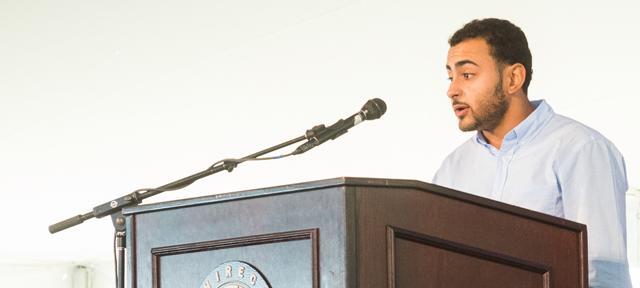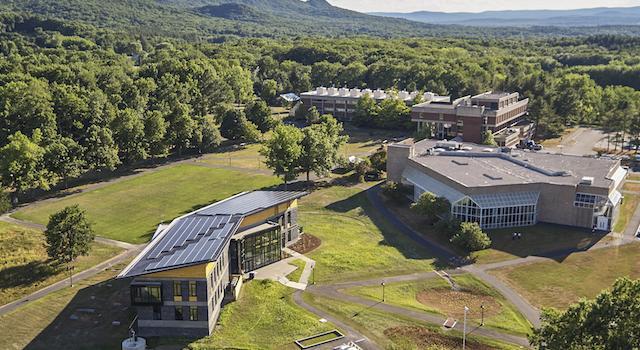"It Was A Building That Spoke The Loudest"

On September 16, the formal dedication of an extraordinary new building on campus was the rationale for an inspired daylong event.
Almost 700 members of the greater Hampshire community came together to celebrate the milestone. And as with all things Hampshire, they were here to learn, to educate, to influence. The day’s theme, “What Buildings Should Do: Environmentalism and Environmental Justice,” att acted a wide range of alums, parents, friends, students, faculty, and staff — from entrepreneurs to architects to activists — to talk about the human implications of a building that makes its own energy, harvests its own water, and treats its own wastes. Special guests were renowned figures who not only share the College’s mission and values, but also challenged with provocative questions and insights: urban-revitalization strategist Majora Carter; Stonyfi d Farm chairman Gary Hirshberg 72F; author, educator, and environmentalist Bill McKibben; and Living Building Challenge creator Jason McLennan. The festivities brought moving remarks, a compelling panel discussion, tours of the R.W. Kern Center and the College’s new solar array, and hours of camaraderie and connection. Attendees also got to work: In dozens of discussion groups, they brainstormed how to scale up best practices in sustainability in the areas of education, environmental justice, and industry. Gary Hirshberg summed up the Kern Center’s importance this way, and his words were felt deeply: “Despite all of the incredible elements in this structure,” he said, “the most exciting tome is the inextricable involvement of students in every step of the process — from design, through building, through modeling, through improving. This process is what’s greatest for me because what’s now needed in the world is not more talk about sustainability. Sustainability is not atopic. It’s a fully integrated way of thinking —absolutely coincident with everything about Hampshire, everything that we who have been here know and love.”
“Our Relationship to What Is Ahead”
by Jonathan Wright 70F
Forty-eight years ago this month, a sixteen-year-old boy arrived on what was not yet the campus of what was not yet the College. Dire predictions as to his future held sway at times, but did not endure. None of that mattered because the people of Hampshire then, as now, befriended him. They did not tell him he was an early one, maybe even the first one. That was the future that was about to be.
What is our relationship to what is ahead, even as the Buddhists remind us it does not actually exist? What words can a poet chase into the underbrush and back out into the open to say it simply? Engage? Sure. Explore? Okay. Critique? Maybe. Embrace? Sure. But what will you do when you get tired of embracing — and you will get tired with all that embracing. What do our elemental bodies compel us to do? Perhaps it is to befriend the future, in the way that we would unleash all of our passion and humor and loyalty and honor for those and them and all who matter to us, which is everyone. The friendship begins with conversation. Befriend the future.
Jonathan Wright 70F is the founder and senior adviser of Wright Builders, a poet, and a member of Hampshire’s first class. He and his team were contracted to build the R.W. Kern Center.
"Our Inevitable Connectedness"
by Dante Mena 15F
“Why are you turning off all the lights?” my mother asked me last January, when I came home for break. “To save energy, Ma.” But, mijo, we don’t pay for light, she replied.
It’s true. We live in a project apartment in the South Bronx of New York City. We pay low rent, and utilities are practically covered. I was raised to believe that environmentalism observed by white people just did not apply to me. Both directly and indirectly, I was just not part of the bigger picture.
That is, until I came to Hampshire.
I took “Modeling Systems” with Sarah Hews last fall, using the beautiful Kern Center, which changed my perspective on sustainability. It reminds us that we all have a part in the world we live in. Before last fall, if you had told me that a building could be living, I would reply that such an idea is absurd. I didn’t know that microbial activity pretty much sustains life in everything. I had no idea. Experiments modeling the systems that make up this building shed light on the significance of our contributions on the environment around us. I learned about our inevitable connectedness from the common goal of preserving life around us.
For me, it’s not about what we know, but what we do that matters. It’s not chiefly about environmentalism not seeping its way into low-income neighborhoods, but about those who do know having a responsibility to act on their knowledge. I suppose that’s why I turned off the light when I returned home, because I had learned it was my responsibility to.
Dante Mena 15F, a second-year Div II student from the South Bronx, New York, is concentrating in mathematics but being drawn to premed (“an excruciatingly long process, but who knows?”).
From the Fall 2016 issue of Hampshire's Non Satis Scire magazine.



